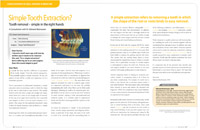Modern tooth extractions are much less painful and disruptive than in years gone by. However, they still represent a trauma to your body, and you should take the time to look after your oral health carefully until the wound is fully healed. Here’s what to do.
If your dentist has placed a gauze over the wound, leave it in place for two hours unless you’ve been told differently. After two hours a clot should have formed and all bleeding stopped, and the gauze can be carefully removed.
Try and get some rest to help you recover more quickly. If possible, take the rest of the day off work, and avoid exercise of all kinds for at least 24 hours. Any activity which raises your pulse risks opening up the wound again.
Break down biofilm with PerioRenew
Unhealthy gums can dramatically impact more than just your smile. Learn more about this revolutionary new gel for gum disease.
sponsored ad
Your mouth will likely feel strange because of the newly created gap. However, resist the urge to feel out the wound with your tongue, and especially avoid touching the gap with your fingers.
Until the wound is fully healed, even a small touch can dislodge the vital blood clot and delay recovery. Even worse, any bacteria which find their way into the wound can quickly cause serious infections in the tender gums.
Take only the painkillers advised by your dentist, which will usually be paracetamol or ibuprofen. Avoid aspirin, as this will work as a blood thinner and slow down clotting and healing.
Avoid smoking for at least 48 hours after an extraction as the chemicals in the smoke can delay healing, and even provoke serious complications such as inflammation of the empty socket.
Similarly, drinking alcohol can slow down clot formation, cause new bleeding, and delay healing.
Even if you have a bad taste in your mouth, avoid using mouthwash, especially those products containing alcohol. The action of rinsing and spitting can easily open up the wound again. However, if the bad taste lasts for longer than a day or two, call your dentist for advice.
You may not feel particularly hungry after an extraction, but if you do, stick to soft foods in small portions to avoid difficulties chewing. In particular, avoid anything with a hard or chewy texture, such as raw vegetables, fruits, or candy.
While it’s important not to become dehydrated, especially after any heavy bleeding, sip only small amounts of drinks at body temperature when you’re thirsty. Hot drinks can dissolve the clotting before the wound fully heals, while cold drinks can give a nasty shock to the newly tender areas.
Also, avoid using a straw to drink, as the sucking action can irritate the wound, potentially leading to a complication known as dry socket.
Using an ice pack on the outside of your cheek can reduce swelling, speed up healing, and provide some relief from any discomfort. However, if the ice causes any strange itching sensations, or increased pain, then stop using it immediately and consult your dentist if the symptoms continue.
If all goes well, you should be completely over the extraction within a week. However, if you find that you’re still feeling strong effects after 24 hours, then speak to your dentist or oral surgeon, who can advise if a return to the surgery is necessary.
 A Simple Tooth Extraction?
A Simple Tooth Extraction?
From a procedural or professional standpoint, a simple extraction refers to removing a tooth in which the shape of the root or roots lends to easy removal… Read Article

